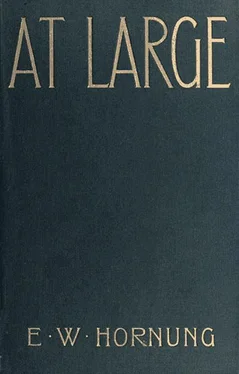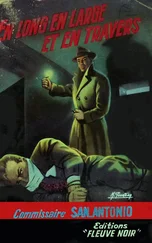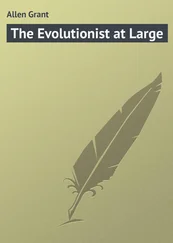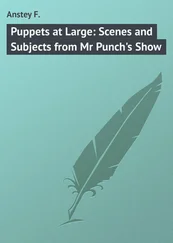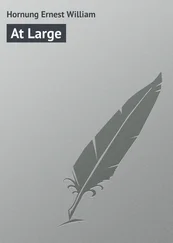E Hornung - At Large
Здесь есть возможность читать онлайн «E Hornung - At Large» весь текст электронной книги совершенно бесплатно (целиком полную версию без сокращений). В некоторых случаях можно слушать аудио, скачать через торрент в формате fb2 и присутствует краткое содержание. Жанр: Старинная литература, на английском языке. Описание произведения, (предисловие) а так же отзывы посетителей доступны на портале библиотеки ЛибКат.
- Название:At Large
- Автор:
- Жанр:
- Год:неизвестен
- ISBN:нет данных
- Рейтинг книги:3 / 5. Голосов: 1
-
Избранное:Добавить в избранное
- Отзывы:
-
Ваша оценка:
- 60
- 1
- 2
- 3
- 4
- 5
At Large: краткое содержание, описание и аннотация
Предлагаем к чтению аннотацию, описание, краткое содержание или предисловие (зависит от того, что написал сам автор книги «At Large»). Если вы не нашли необходимую информацию о книге — напишите в комментариях, мы постараемся отыскать её.
At Large — читать онлайн бесплатно полную книгу (весь текст) целиком
Ниже представлен текст книги, разбитый по страницам. Система сохранения места последней прочитанной страницы, позволяет с удобством читать онлайн бесплатно книгу «At Large», без необходимости каждый раз заново искать на чём Вы остановились. Поставьте закладку, и сможете в любой момент перейти на страницу, на которой закончили чтение.
Интервал:
Закладка:
After all, it would only be a temporary trouble; for Dick had evolved a great scheme for the future, which was this: He would go out and buy a small station in a first-rate district—at arm's length, indeed, from towns and railroads, but still just in touch with civilisation. Then he would send home for them all. Yes, all. For Maurice would make an ideal book-keeper. Fanny would revel in the life, and Mrs. Edmonstone would certainly prefer it to the small house at Teddington. This plan was conceived, matured, calculated out, and found feasible, during the many long summer nights wherein Dick never closed his eyes, when perhaps it was well that there was this object of focus for his mind.
As for his attitude towards Flint, Dick was well aware that his access of reserve, after the way in which he had unburdened his soul at their first meeting, must appear strangely inconsistent. He had rushed to join his friend on the Continent, travelled with him for nearly a month, and not told him another word of his affairs. It could not be helped; it would be impossible to tell Flint anything of what had followed their first talk at Teddington without making a clean breast of his discovery that Miles the Australian was no other than Sundown the bushranger, and this Dick would not tell a soul unless Miles broke faith with him. Least of all would he confide in Flint, for Flint would be the very first to turn round and call him madman.
Nevertheless the days seemed to chase each other pleasantly enough for one and all, actually doing so for all but one; and, as always happens in such cases, the fortnight drew far too quickly to its close.
"To-day is Thursday—the Twelfth, by-the-bye—and here we are within sight of Sunbury Lock; and on Monday, and ever afterwards, the bank; the blessed bank!"
This cheerful reminder proceeded (one day up the river) from the lips and soul of the man in the stern, who was steering. There was a sympathetic groan from the man in the bows, who was smoking. The working half of the crew received the observation, which was thrown out gratuitously to all, in business-like silence, broken only by the flash of four sculls as one, and the swish of the feather blades through the air. The groan in the bows was followed by a reflection of kindred pathos, delivered in a high key:
"We will call next Monday Black Monday; for to me it means Holyhead, Dublin, Kerry, and tenants! blessed tenants! But not for always," added Flint suddenly; "I don't say 'ever afterwards;' why should you? Why should I be a slave to my Castle and you to your City? Why shouldn't we emigrate together?"
No one in the boat could see the speaker's face; it was impossible to tell whether he was jesting or serious.
"Oh, I'm game!" cried Maurice, very much in earnest at once.
"Well, then, just hold on till I give Castle Flint the sack."
"Or until it is sacked about your ears," suggested stroke jerkily. "But what nonsense you two are talking!"
"Not at all, Miss Edmonstone—if you will allow me. You can't expect a man to live out his life in troubled Ireland when there's a happy Australia to go to: there, you know, you may combine the blessings of liberty, equality, and Home Rule of the most advanced kind, with the peculiar satisfaction of calling yourself a staunch Tory, and believing it! But as for our friend here, station life would add a year to his life for every year the City is capable of shortening it. He'd make a first-rate jackeroo."
"What is that?"
"What's a jackeroo? Oh, a young gentleman—for choice, the newest new chum to be found—who goes to a station to get Colonial experience. He has to work like a nigger, and revels in it, for a bit. If he is a black sheep, and has the antique ideas of the Colonies held by those who sent him out to whiten him, his illusions may last a couple of days; if he has read up Australia on the voyage, they will probably hold out a little longer, while he keeps looking for what his book told him he would find; the fact being that the modern bush life hasn't yet been done into English. Meanwhile he runs up the horses, rides round boundaries, mends fences, drives sheep to water—if it is a drought—and skins the dead ones, weighs out flour and sugar, cleans harness, camps anywhere, and lives on mutton and damper, and tea."
"But what does he get for all that?" asked Maurice, with visions of money-bags.
"Rations and experience," replied Flint promptly. "When he's admitted to be worth his salt he will be asked to make other arrangements. Then some still newer new chum will be selected for the post, through the introductions he has brought to the stock and station agents, and in his turn will drive his teeth into the dirty work of the station, which the ordinary pound-a-week hands refuse, and so get his Colonial experience!"
"Thanks; I'll stop where I am," said Maurice.
"He isn't fair," said Dick, speaking for the first time. "You know you aren't fair, old chap, raking up your own case as typical, when it was exceptional. Jackeroos are treated all right, and paid too, so long as they're smart and willing—the two things needful. Come, I've been a squatter myself, and can't hear my class run down."
"You won't hear me defend the landlords on that ground," remarked Flint, who had contracted eccentric politics.
"Well," said Dick, experimentally, "if I go back to it, Maurice shall be my jackeroo, and judge for himself whether you haven't painted us too black."
He shipped his oars. Flint was standing up with the boat-hook to pilot them through the open lock-gates.
"Then I'll ride the boundaries!" cried Fanny, who sat a horse like a leech, but had had no mount for years.
"In that case," added Flint quietly, "I'll apply for overseer's billet, with the right of sacking slack hands."
For a moment Dick looked really pleased: this jesting about a station in Australia was, so far, feeling the way, and might make matters a trifle easier when the time came. But the smile quickly faded from his face. In truth, on no day during these last weeks had he been so troubled in spirit, so tossed between the cross-currents of conflicting feelings.
That morning he had received two letters, apparently of contrary character: for while the perusal of one gratified him so intensely that he could not help handing it round for them all to see, the mere sight of the other was sufficient to make him thrust the unopened envelope hurriedly into his pocket.
The first letter was indeed a matter for congratulation, for it was the most completely satisfactory, though not the first, of several similar communications which Dick had received since his return from Australia. It was a short note from the editor of the "Illustrated British Monthly," accepting (for immediate use: a great point) a set of sketches entitled "Home from Australia," which set forth the humours and trials of a long sea voyage, and were, in fact, simply a finished reproduction of those sketches that had delighted the passengers on board the Hesper. But it was more than a mere formal acceptance: besides enclosing a cheque (in itself a charming feature) to meet the present case, the note contained a complimentary allusion to the quality of the "work," and a distinct hint for the future. This in a postscript—observing that as Australian subjects were somewhat in demand since the opening of the Colonial Exhibition—he (the editor) would be glad to see anything thoroughly Australian that Mr. Edmonstone might chance to have ready.
Of course the precious note was read aloud, and greeted with cries of delight. Fancy an opening with the "Illustrated British" at this stage! What could be better? And it did look like a real opening. The hero of the moment alone sat silent; the unread letter in his pocket checked his speech; it was from Yorkshire.
"Why did you ever leave us, when you can do so splendidly here at home?" Mrs. Edmonstone asked him, half in regret for the past, half in joy for the future.
Читать дальшеИнтервал:
Закладка:
Похожие книги на «At Large»
Представляем Вашему вниманию похожие книги на «At Large» списком для выбора. Мы отобрали схожую по названию и смыслу литературу в надежде предоставить читателям больше вариантов отыскать новые, интересные, ещё непрочитанные произведения.
Обсуждение, отзывы о книге «At Large» и просто собственные мнения читателей. Оставьте ваши комментарии, напишите, что Вы думаете о произведении, его смысле или главных героях. Укажите что конкретно понравилось, а что нет, и почему Вы так считаете.
